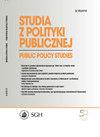How is the urban governance changing in response to the pandemic? The case of Milan
Studia Z Polityki Publicznej - the Journal of Public Policy Studies
Pub Date : 2022-12-04
DOI:10.33119/kszpp/2022.3.2
引用次数: 0
Abstract
This article deals with the effects of COVID-19 on the urban governance of Milan. The author argues that, despite the changeable situation still ongoing, looking at the measures assumed in 2020, the Municipality of Milan took middle-term strategies and radical decisions for the design and the use of the city from a perspective of sustainable prosperity together with the pandemic management. According to the "Milano 2020" Adaptation Strategy, several policies were adopted in order to decongest public areas through the enlargement of spaces and services. In particular, during that period, the administration planned new policies in order to empower urban flexibility, rhythms and times, diversified mobility, public and green spaces, infrastructures, cooperation, and inclusion. In conclusion, the author argues that the pandemic has redefined the urban prosperity of Milan in relation to the sustainable transition and the new social challenges determined by the global scenario.为应对疫情,城市治理发生了怎样的变化?米兰案例
本文探讨了新冠肺炎对米兰城市治理的影响。作者认为,尽管形势仍在变化,但从2020年采取的措施来看,米兰市政府从可持续繁荣和疫情管理的角度,对城市的设计和使用采取了中期战略和激进决策。根据“米兰2020”适应战略,采取了几项政策,通过扩大空间和服务来缓解公共区域的拥挤。特别是,在此期间,政府规划了新的政策,以增强城市的灵活性、节奏和时间、多样化的流动性、公共和绿地、基础设施、合作和包容性。最后,作者认为,疫情重新定义了米兰的城市繁荣,与可持续转型和全球形势决定的新的社会挑战有关。
本文章由计算机程序翻译,如有差异,请以英文原文为准。
求助全文
约1分钟内获得全文
求助全文
来源期刊

Studia Z Polityki Publicznej - the Journal of Public Policy Studies
policy studies, public policy, sociology, public administration, public health -
自引率
0.00%
发文量
15
审稿时长
60 days
 求助内容:
求助内容: 应助结果提醒方式:
应助结果提醒方式:


